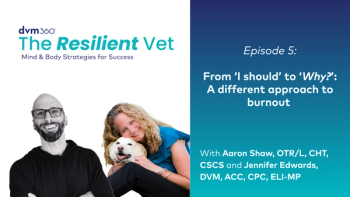
Kindergarten life: All I really need to know about veterinary medicine I learned in kindergarten
We learned these 10 things long ago, and veterinary school students remind me of them daily.
It's been 26 years since Robert Fulghum wrote the bestselling All I Really Need to Know I Learned in Kindergarten, a look at childhood lessons that stay true in adulthood. It's past time for the veterinary school edition, courtesy of the timeless lessons I see my students at Virginia-Maryland College of Veterinary Medicine model for me year in, year out ...
Be awed
Remember the first time you got the blood draw on the first stick? Remember the first surgery of yours that went really well? And kittens! Students get excited by the little things that those of us with more experience tend to take for granted. Put up ear mites on the microscope at our school and everyone comes running. When was the last time you found yourself thinking, “Cool!” because of something you did or saw?
Ask, “Why?”
It's surprising the number of times students ask and my gut response is, “That's just always how I've done it.” But those are opportunities to question my assumptions and look at something in a different light.
It's OK not to know-look it up
You don't actually have to know everything, but you do need to know where to find the answer. Clients appreciate the honesty that you're not all knowing. What students don't know is that some of the time while they run off to look it up, I'm sneaking to go look it up myself.
Go ahead and learn it now
So many people have to switch up their veterinary careers based on new medical interests, the job market or big life changes. Just because it isn't in your plans today doesn't mean you won't need it tomorrow.
Treat others like they know more than you (because they might)
Remember when technicians were gods, possessing a depth of knowledge you couldn't even hope to attain? My students know that feeling. Get back to thinking like them. Listen to your staff's advice; a lot of the time, they still know more than you-about the client, about the patient, about a lot.
It's fun to learn
I love hearing excited students ask, “Can we have rounds on ... ?” It's easy to get bogged down in day-to-day practice. Go to a conference. Read a trade magazine. Schedule a lunch 'n' learn on a topic you're curious about. Have fun getting smarter!
Take time for potty breaks
Students haven't learned the bladder-destroying work ethic that ignores their own wellbeing. How many times have you said to yourself, “I'll use the bathroom/have lunch/etc. as soon as I finish with … ” Make a little time for yourself during the day to recharge. And urinate.
Eat
On the last Friday of every block, veterinary students here organize a potluck they call Food Friday. Sitting down and sharing a meal helps to refocus and reconnect with veterinary teammates. It doesn't just fill your stomach-it refills your passion.
Have a big goal
Every student has one big goal: graduation. It's so much a part of their lives that they sign off all their emails with “Class of 2016” or “DVM Candidate 2016.” How often do you feel stuck on the neverending hamster wheel of clients and patients in practice? Everyone needs a long-term goal, something you work toward and get satisfaction from seeking and achieving.
Be done
Despite their bubbling enthusiasm for new veterinary knowledge, students want to go home on time. They want to spend time with significant others, pets, family and friends. Be like a student and go home!
Dr. Nappier is assistant professor of community practice in the Department of Small Animal Clinical Sciences at Virginia-Maryland College of Veterinary Medicine.
Newsletter
From exam room tips to practice management insights, get trusted veterinary news delivered straight to your inbox—subscribe to dvm360.






